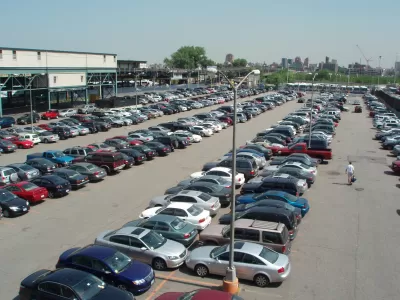Cities like Vancouver are rethinking parking minimums as they try to meet climate goals, reduce traffic, and reallocate street space to other modes.

To counter the current model of prioritizing parking with each new development, Vancouver's city council approved a motion shifting focus toward "open option parking," giving developers a choice when it comes to providing on-site parking. Acknowledging that car owners will look for on-street parking, the city is also implementing a permit parking system for resident vehicles. The goal, writes Frances Bula for the Sightline Institute, is to signal to the public that "roads are not free space or a right to free car storage," a mentality that has prevailed for decades in cities.
Like many cities, Vancouver has a parking requirement of roughly one stall for every residential unit and similar rules for different types of commercial and office space. Removing these requirements would make it the second Canadian city, and only one of a few in North America, to legalize optional on-site residential parking in the entire city.
Critics of "excessive" parking mandates argue that the regulations raise the cost of construction, reduce the space available for pedestrians, bikes, and other uses, and prioritize car owners above everyone else. As cities move to reduce greenhouse gas emissions, alleviate congestion, and provide more affordable housing, parking policies have come to signify an outdated planning tool that negatively impacts neighborhoods and the environment.
FULL STORY: The Hidden Costs of “Over-Parking” Our Cities

Study: Maui’s Plan to Convert Vacation Rentals to Long-Term Housing Could Cause Nearly $1 Billion Economic Loss
The plan would reduce visitor accommodation by 25,% resulting in 1,900 jobs lost.

North Texas Transit Leaders Tout Benefits of TOD for Growing Region
At a summit focused on transit-oriented development, policymakers discussed how North Texas’ expanded light rail system can serve as a tool for economic growth.

Why Should We Subsidize Public Transportation?
Many public transit agencies face financial stress due to rising costs, declining fare revenue, and declining subsidies. Transit advocates must provide a strong business case for increasing public transit funding.

How to Make US Trains Faster
Changes to boarding platforms and a switch to electric trains could improve U.S. passenger rail service without the added cost of high-speed rail.

Columbia’s Revitalized ‘Loop’ Is a Hub for Local Entrepreneurs
A focus on small businesses is helping a commercial corridor in Columbia, Missouri thrive.

Invasive Insect Threatens Minnesota’s Ash Forests
The Emerald Ash Borer is a rapidly spreading invasive pest threatening Minnesota’s ash trees, and homeowners are encouraged to plant diverse replacement species, avoid moving ash firewood, and monitor for signs of infestation.
Urban Design for Planners 1: Software Tools
This six-course series explores essential urban design concepts using open source software and equips planners with the tools they need to participate fully in the urban design process.
Planning for Universal Design
Learn the tools for implementing Universal Design in planning regulations.
City of Santa Clarita
Ascent Environmental
Institute for Housing and Urban Development Studies (IHS)
City of Grandview
Harvard GSD Executive Education
Toledo-Lucas County Plan Commissions
Salt Lake City
NYU Wagner Graduate School of Public Service





























